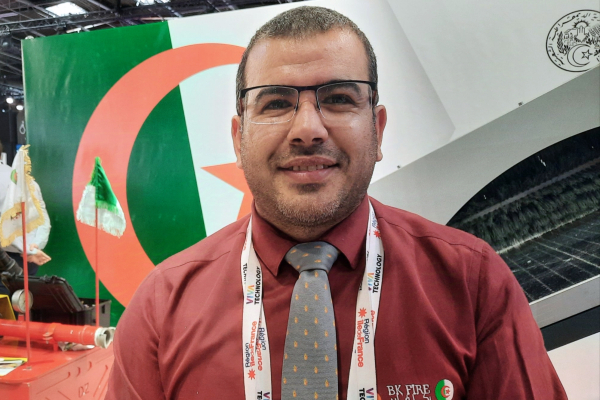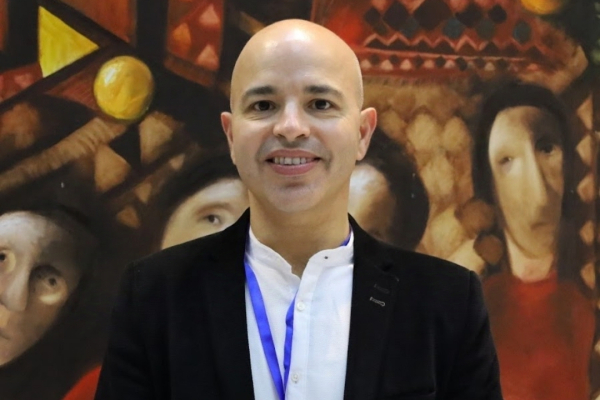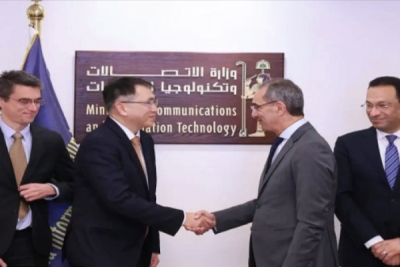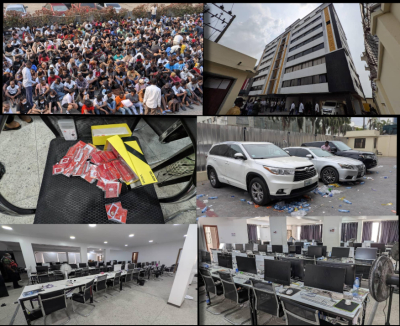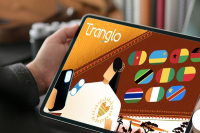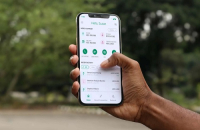A technology entrepreneur, he is one of the most dynamic figures in robotics innovation across Africa. In Algeria, he designed the very first firefighting robot, created to assist firefighters in combating fires more effectively.
Khaled Basta (photo) is a leading expert in smart fire prevention and firefighting solutions. He is the co-founder and CEO of BK Fire, a technology company specializing in fire safety solutions.
Founded in 2015, BK Fire stands out for its innovative approach to safety in Algeria. The company provides professional services, including the installation of fire detection and suppression systems and the design of safety plans that comply with current standards. Its solutions are tailored to the specific needs of each business, ensuring the safety of employees and infrastructure.
In 2021, BK Fire introduced Icosium, Algeria’s first 100% locally designed firefighting robot. This groundbreaking robot assists firefighters in hazardous or collapse-prone areas during fires. Remotely operated, Icosium is capable of detecting and extinguishing fires. Equipped with advanced artificial intelligence and a thermal camera, the robot can locate fire hotspots and identify human silhouettes or injured individuals.
“We can use the robot in confined, dangerous, or high-risk areas such as tunnels or warehouses to ensure fire suppression and cooling. Icosium is also equipped with an artificial intelligence system. If there is heavy smoke, the thermal camera detects the hotspot, and the AI takes over to perform an automatic scan. It can even detect a human silhouette or an injured person,” Khaled Basta explained in May 2024.
In February 2024, Khaled Basta launched BK Robotronics, a robotics company offering innovative solutions entirely designed and manufactured in Algeria. Its portfolio includes industrial robots, autonomous drones, computer vision systems, and custom automation solutions.
Before venturing into entrepreneurship, Khaled Basta served as General Manager at IM Industrielle, a company specializing in fire safety and industrial electrical services.
By Melchior Koba,
Editing by Sèna D. B. de Sodji
As an entrepreneur and expert in digital transformation, he is committed to developing innovative solutions to optimize the management of companies in the industrial sector.
Mohamed Louati (photo) is a Tunisian data analysis expert and tech entrepreneur, serving as the co-founder and CEO of Logimes, a technology company that specializes in solutions for the industrial sector.
Founded in 2021, Logimes is a digital services startup that assists industrial companies in implementing production management systems for their workshops. The company enables real-time tracking of work-in-progress, evaluation of operator performance, and measurement of overall production efficiency.
"Our goal is to be the strategic partner that guides the transition to advanced production management systems, improving operational efficiency and competitiveness in the era of Industry 4.0. By leveraging innovation, commitment, excellence, and collaboration, our mission is to deliver customized solutions and drive our clients’ success for a more efficient and sustainable future," states the company’s website.
Among Logimes' offerings are Fastuz, a learning platform designed to provide practical training tailored to labor market needs, helping learners succeed in their careers, and DAS ERP, a comprehensive enterprise resource planning solution.
Mohamed Louati holds an engineering degree in statistics and information analysis, with a focus on data analysis, which he earned in 2004 from the Higher School of Statistics and Information Analysis. He also obtained a master’s degree in economic modeling and econometrics in 2005 from Tunisia Polytechnic School.
His professional career began in 2004 at Karmex, an industrial company, where he worked as an analyst and administrator of an enterprise resource planning (ERP) system. In 2011, he joined Logidas, an ERP solutions provider, where he advanced through various roles including business developer, operations director, and eventually co-CEO.
By Melchior Koba,
Editing by Sèna D. B. de Sodji
The Egyptian government is relying on cooperation to achieve its digital transformation goals. For example, an agreement was signed in September to strengthen Chinese investments in the national ICT sector.
Egypt is exploring opportunities to deepen its cooperation with the World Bank in the digital sector. Amr Talaat, the Egyptian Minister of Communications and Information Technology, met with Sangboo Kim, Vice President for Digital Development at the World Bank, who visited the country from Tuesday, December 17, to Thursday, December 19.
Discussions focused on digital transformation, the development of technological infrastructure, raising digital awareness, and enhancing digital skills. Mr. Kim emphasized the importance of sharing Egypt’s digital transformation experience with other nations and leveraging the country’s expertise to help others achieve their digital goals.
This engagement aligns with Egypt’s efforts to accelerate the implementation of its national digital transformation strategy, Digital Egypt 2030. The Egyptian government is aiming to develop the ICT sector and modernize national telecom infrastructure, positioning the digital economy as a driver of socio-economic development.
Currently, Egypt ranks sixth in Africa and 95th globally on the 2024 E-Government Development Index (EGDI), according to the United Nations Department of Economic and Social Affairs (UNDESA). The country scored 0.6699 out of 1, surpassing the averages for North Africa (0.5776), Africa (0.4247), and the world (0.6382). In ICT development, the International Telecommunication Union (ITU) places Egypt ninth among 47 African countries, with a score of 76.8 out of 100.
While a partnership with the World Bank could support Egypt’s digital transformation objectives, the details of such collaboration remain undefined. As of now, no agreements have been signed or announced between the two parties. Further developments will be needed before drawing conclusions about the prospects of this cooperation.
By Isaac K. Kassouwi,
Editing bySèna D. B. de Sodji
To assist victims of violence, especially women and children, an NGO has developed a mobile application with a range of tools to combat this issue.
Zonza/Loba, a mobile application launched on Tuesday, November 25, 2024, by the Congolese NGO Azur Développement, aims to mark the International Day for the Elimination of Violence Against Women. Available in French, Lingala, and Kituba, the app is designed to raise awareness about the various forms, manifestations, and consequences of gender-based violence.
“This initiative directly addresses the numerous requests for support we receive from women and girls who have survived violence. These requests often come through our one-stop assistance centers run by Azur Développement, primarily via email. We also consistently receive requests to organize awareness campaigns to prevent violence against women and children,” explained Sylvie Niombo, Director of Azur Développement.
The app, available exclusively on Android, offers several sections that provide information on gender-based violence, available resources, and guidance on how to respond in such cases. It helps users understand the necessary steps to take in response to violence and directs them to appropriate support services, such as one-stop assistance centers for women and children. In dangerous situations, Zonza/Loba includes an alert feature that allows users to quickly notify the police or their loved ones.
“The app also allows users to call the police or send predefined alert messages to close contacts. Additionally, it can be used to reach the one-stop assistance centers to request support for victims of violence or to report cases of violence against women and children,” added Sylvie Niombo.
Adoni Conrad Quenum
On December 18, the African Development Bank announced a $10 million investment from its Sustainable Energy Fund for Africa (SEFA) to support the Persistent Africa Climate Venture Builder Fund (ACV Fund) in advancing climate technology entrepreneurship across Sub-Saharan Africa.
The Fund will address critical financing needs for early-stage climate technology entrepreneurs, focusing on key sectors, including solar energy solutions, energy efficiency technologies, electric mobility, agricultural technology, and circular economy innovations.
The initiative emphasizes supporting African entrepreneurs, particularly women-owned and -managed businesses, including the creation of over 66,000 jobs, with a significant portion benefiting women.
Cybercrime threatens Nigeria’s economic growth by tarnishing its reputation and discouraging foreign direct investment. With Nigeria positioned as one of Africa's largest economies, eradicating cybercrime is critical to maintaining investor confidence and securing its burgeoning digital economy.
The Economic and Financial Crimes Commission (EFCC) has arrested 792 suspects in a major raid targeting cryptocurrency investment fraud and romance scams. The operation, conducted on December 10, 2024, focused on a seven-story building, Big Leaf Building, at No. 7 Oyin Jolayemi Street, Victoria Island, Lagos.
EFCC Chairman Ola Olukoyede, represented by Director of Public Affairs Commander Wilson Uwujaren, revealed that the suspects included 148 Chinese nationals, 40 Filipinos, two Kazakhstani nationals, one Pakistani, and one Indonesian, alongside their Nigerian collaborators. The building served as a hub where foreign syndicates trained Nigerians to execute scams targeting global victims.
Investigators uncovered advanced computers on all floors and 500 SIM cards linked to local telecom providers. Nigerian recruits were selected for their typing and computer skills, then trained to create fake profiles, engage victims in romantic or investment scams, and promote a fraudulent platform, www.yooto.com. Activation fees on the platform started at $35.
The foreign syndicate leaders handled defrauding victims and cut off the Nigerians from the proceeds. Recruits lacked formal contracts and were paid in cash or via personal accounts.
Olukoyede highlighted collaboration with international partners to uncover links to global fraud networks. He countered the notion that Nigerians are the primary perpetrators of fraud, stating that foreign syndicates exploit Nigeria’s reputation to mask operations.
The raid follows a November 2024 operation where Nigerian police arrested 130 suspects, including 113 foreign nationals, for cybercrimes and activities threatening national security. These efforts align with the Cybercrimes Act of 2015, which criminalizes identity theft, phishing, and hacking, reflecting Nigeria’s commitment to tackling cybercrime on a global scale.
Hikmatu Bilali
The expansion of fibre optic network in Africa is a critical development in the journey toward digital transformation. This achievement supports key objectives, including bridging the digital divide, fostering economic growth, and strengthening the continent’s position in the global digital economy.
Technology services provider of the Federal Government of Nigeria, Galaxy Backbone (GBB), has successfully deployed its cutting-edge fibre optic network in Lagos, Ibadan, and Ilorin, it announced on December 16. This marks a major milestone in Phase II of the National Information and Communication Technology Infrastructure Backbone (NICTIB) project. The expansion reflects GBB's commitment to enhancing Nigeria's digital connectivity and accelerating its transformation into a digitally inclusive nation.
Prof. Ibrahim A. Adeyanju, Managing Director/CEO of Galaxy Backbone, hailed the achievement, stating: "The expansion of our fibre optic network to Lagos, Ibadan, and Ilorin is a significant step in bridging the digital divide and positioning Nigeria as a global leader in the digital economy. This infrastructure empowers us to deliver innovative, customer-focused solutions for both the public and private sectors."
With an extensive cross-country optical fibre backbone now spanning over 5,000 kilometers across 27 state capitals, GBB continues to solidify its role as Nigeria’s digital backbone. The project integrates the nation’s six geopolitical zones, enhancing digital inclusion and fostering economic growth.
The newly completed Abuja-to-Lagos route, which connects key cities such as Minna, Bida, Mokwa, Ilorin, Ogbomoso, Oyo, Ibadan, and Lagos, is a strategic development designed to bolster network reliability. This closed-loop network ensures service redundancy and reduces potential downtime, offering users a seamless, world-class digital experience.
The fibre optic network enhances high-speed, secure connectivity for government institutions and businesses, empowering them to thrive in an increasingly digital world. With this deployment, GBB reinforces its commitment to Nigeria’s socio-economic growth and its vision of a digitally inclusive society.
As Galaxy Backbone (GBB) extends its network, it reinforces its position as a key partner in driving Nigeria's digital economy, fostering innovation, and enabling sustainable development. This initiative aligns with GBB’s vision of building a smarter government, which will pave the way for smart communities, cities, and a more technology-driven nation. It also marks a significant step towards fulfilling its mandate of operating a nationwide IP-based network to provide a unified platform for connectivity and infrastructure services for all Government Ministries, Departments, and Agencies (MDAs).
The expansion aligns with Nigeria's National Broadband Plan 2020-2025 which aims to increase broadband penetration to 90% by 2025, a goal supported by GBB’s ongoing projects.
Hikmatu Bilali
The e-commerce market in Nigeria is undergoing rapid transformation, driven by a tech-savvy youth population and the growing adoption of online shopping. The entry of international players is intensifying competition, bringing both challenges and opportunities for the local economy.
Three weeks after its launch in Nigeria, Chinese online retailer Temu has soared to the top of download charts on both Android and Apple Store. Its swift success stems from a targeted marketing campaign combined with a compelling offer of low-priced products imported directly from China. By tailoring its services to local needs—such as payments in naira and home delivery—Temu has captured the attention of Nigerian consumers.
Temu’s entry into Nigeria is part of a broader strategy by Chinese e-commerce giants like Shein, Aliexpress, and TikTok Shop to offset increasing restrictions in Western markets. Following its debut in South Africa, Nigeria became Temu’s second African market, solidifying its foothold on the continent.
To break into Nigeria, Temu employed an aggressive launch strategy backed by massive advertising investments. In 2023, the company was Meta's largest advertiser, spending nearly $2 billion on ads. This approach has not only outpaced established local and international competitors but also driven up advertising costs for rivals.
Temu’s key advantage lies in its direct-shipping model, sourcing products directly from Chinese manufacturers. By cutting out intermediaries, it offers a wide range of ultra-competitive prices, appealing to a market characterized by high price sensitivity and low brand loyalty.
However, this model poses significant challenges for the local economy. The influx of low-cost imported goods puts pressure on domestic platforms like Jumia and threatens small Nigerian businesses, especially in the growing fashion and design sectors.
Temu’s arrival has drawn mixed reactions. While consumers applaud access to affordable and diverse products, analysts warn of long-term repercussions for local enterprises. Some experts urge the government to consider protective measures, inspired by countries like Indonesia and Vietnam, which have implemented taxes and tariffs to safeguard their domestic markets from e-commerce giants.
Policies requiring foreign firms to create local jobs or establish production centers could help mitigate the economic impact while leveraging foreign investment.
Nigeria’s e-commerce market, valued at $8.53 billion in 2024, is projected to reach $14.92 billion by 2029, growing at an annual compound rate of 11.82%, according to Mordor Intelligence's E-commerce in Nigeria Market Size & Share Analysis (2024-2029). This rapid growth reflects the increasing adoption of online shopping, driven by a young, tech-savvy population.
To ensure this growth benefits the local economy, Nigeria must strike a balance between welcoming international players and protecting local businesses. Temu’s rapid rise highlights the transformative shifts in Nigeria’s e-commerce landscape while raising critical questions about maintaining a sustainable economic ecosystem.
By Samira Njoya,
Editing by Sèna D. B. de Sodji
Mobile wallets are rapidly gaining popularity in Africa, offering a viable alternative to traditional banking services for a significant portion of the population that lacks access to them. These digital wallets are particularly useful for facilitating money transfers, especially international remittances.
Singapore-based cross-border payment company Tranglo announced on Monday, December 16, the addition of 10 new African countries to its payment network. This expansion increases its coverage on the continent to 25 countries, providing an additional option for international remittances to Africa.
The newly covered countries include Benin, Cameroon, the Democratic Republic of Congo (DRC), The Gambia, Guinea, Guinea-Bissau, Ivory Coast, Malawi, Rwanda, and Tanzania. At launch, all new markets will support peer-to-peer electronic wallet transactions, enabling near-instant transfers in local currencies.
This move comes amid a surge in mobile money adoption across Africa. According to the GSMA’s State of the Industry Report on Mobile Money 2024, mobile money subscriptions grew by 19% between 2022 and 2023, reaching 856 million. Total transactions increased by 28% to 62 billion, while the value of these transactions rose by 12% to $919 billion.
The growth of mobile money has made international remittances more accessible, which are "essential for many African families, helping them address urgent challenges such as food insecurity, drought, supply chain disruptions, flooding, and debt servicing," the GSMA notes. In 2023, international remittances and merchant payments saw the highest growth in usage, with mobile money remittances reaching $29 billion—a 23% year-on-year increase. According to the World Bank, total international transfers to Africa amounted to $90.2 billion.
However, Tranglo's solution will face increasing competition, particularly from telecom operators. For instance, Safaricom’s M-Pesa platform is ramping up efforts to expand its acceptance of international transfers from an ever-growing number of countries.
By Isaac K. Kassouwi,
Editing by Sèna D. B. de Sodji
Designed by two tech entrepreneurs, the tailored solution aims to help small and medium-sized enterprises (SMEs) in Africa embrace the digital revolution. Since its launch, Leja claims its platform is used by over 1.4 million businesses.
Leja is a fintech solution that helps micro, small, and medium enterprises (MSMEs) digitize their management processes. It simplifies the shift from paper-based records to digital systems while promoting the adoption of financial services. Based in Nairobi, Kenya, the startup was founded in 2018 by Tekwane Mwendwa and Morgane Kablan.
"We’re proud to address the challenges MSMEs face, including limited access to affordable payment options and working capital financing. Many MSMEs previously relied on costly and inconvenient methods like cash, which impacted their operations," explains Tekwane Mwendwa.
Leja offers automated record-keeping, 360-degree payment solutions, and loans among its services. "We plan to expand our reach from 5% to 20% by partnering with financial institutions and NGOs to close the credit gap for MSMEs," he adds.
The platform also supports monetary transactions between users. Currently, only 10% of users utilize this function, but the fintech aims to increase this figure to 50%, unlocking significant transaction volumes and revenue potential in the process.
Leja operates exclusively through an Android mobile application. To access its services, a company representative must create an account by providing essential information such as their phone number, full name, national ID number, and email address.
Adoni Conrad Quenum
More...
As a passionate engineer, he is dedicated to creating and developing innovative solutions that meet the unique needs of businesses and individuals. With his latest venture, he aims to revolutionize the insurance industry across Africa.
Louw Hopley (photo), a South African engineer and tech entrepreneur, is the co-founder of Root, a startup revolutionizing the insurance sector through digital transformation.
Founded in 2016, Root offers an innovative digital infrastructure that enables industry players to design efficient, market-driven insurance products. With a modular and fully configurable platform, the startup reduces technological challenges for businesses, allowing them to focus on delivering value to their clients.
Root’s solution features over 500 open insurance APIs, facilitating omnichannel distribution, policy administration, and claims management. The platform is widely used by brands, retailers, insurers, and enterprises to create, launch, and manage insurance products while streamlining policy and claims administration.
Before co-founding Root, where he served as CEO until May 2024, Hopley launched Falkon Apps in 2012. This company specialized in consulting, designing, and developing mobile and web applications, collaborating with international clients to deliver solutions with a strong emphasis on user experience.
Hopley holds a degree in electrical and electronic engineering from Stellenbosch University. He began his professional journey in 2011 at Krit.com, a tech firm connecting clients with business leaders. From 2014 to 2016, he worked as a senior delivery engineer at Journey Apps, a platform dedicated to building custom industrial applications.
By Melchior Koba,
Editing by Sèna D. B. de Sodji
Born in the Democratic Republic of Congo, he moved to South Africa where he founded his first company and gained valuable experience. Now based in the United States, he has successfully launched several other companies, operating both in Africa and in other rapidly growing global markets.
Elijah Lubala (photo) is a Congolese computer scientist and tech entrepreneur who serves as the founder and CEO of Tuma, a company addressing the lack of payment infrastructure in high-growth emerging markets.
Founded in 2022, Tuma offers users a simple, fast payment solution that transforms their phones into a fully functional payment gateway. Through a strategic partnership with UBA, a bank operating in 20 African countries, Tuma enables card payments and digital transactions, supporting small merchants’ growth. The startup also collaborates with financial institutions such as Credit Bank Kenya, InTouch, Appiawave, Cellulant, and Seerbit.
Elijah is also the founder of Attila Group, a private investment firm established in 2013, focused on real estate, technology, and venture capital. Initially based in South Africa, Attila Group later relocated its headquarters to New York, USA. Additionally, he is the founder and Chief Commercial Officer of Elie Technologies Corporation, a company delivering essential products and services tailored to the needs of emerging markets.
Elijah’s entrepreneurial journey began in 2007 with the creation of Sofet Entertainment in South Africa, a company specializing in event production, where he served as Chief Commercial Officer for two years. Afterward, he worked as an executive producer at New Vision Studio. In 2012, he joined Airtel DRC as a junior software engineer before taking on the role of senior software engineer in the Gauteng Department of Infrastructure Development in South Africa from 2013 to 2015.
Academically, Elijah holds a degree in Computer Science and Information Systems, specializing in enterprise systems, application development, and networking, earned in 2015 from Monash University.
In recognition of his entrepreneurial achievements, Elijah Lubala was named to the prestigious Forbes Africa 30 Under 30 list in 2017, highlighting his contributions to the tech industry and the African business landscape.
By Melchior Koba,
Editing by Sèna D. B. de Sodji
He is an entrepreneur who specializes in electronic services across Africa. He designs innovative digital solutions that make everyday life easier for people in Gabon.
Anthony Marat (photo) is a Gabonese businessman and serial entrepreneur. He is the founder of Yoboresto, a meal delivery app. Launched in 2018, Yoboresto simplifies food ordering and delivery in Libreville and its surrounding areas. Through its website and mobile app, users can order meals in just a few clicks from a wide range of partner restaurants.
The platform provides access to menus, pricing, opening and closing hours, customer reviews, and photos. Yoboresto also offers additional services such as table reservations for lunch or dinner and a loyalty program that rewards users with bonus points.
Anthony Marat holds a bachelor's degree in international business from Marymount University in the United States, earned in 2014. He also completed a master's degree in entrepreneurship and international business development at the American Business School in Paris in 2016.
His professional career began in 2010 with internships at prestigious companies, including Citi, Bechtel Corporation, Addax Petroleum, and SCRP Consulting. In 2014, he joined the Franco-American Academy of Management (AFRAM) in Gabon as a project management intern. The following year, he interned in tax and legal services at Deloitte Gabon. In 2017, Marat worked as a business consultant at Vivendi, a company specializing in art promotion, entertainment, and recreational activities.
By Melchior Koba,
Editing by Sèna D. B. de Sodji
Digital transformation offers unique opportunities to reduce inequalities and promote social inclusion. In Côte d’Ivoire, new initiatives highlight the potential of digital technology to empower women.
The Ivorian Ministry of Women, Family, and Children (MFFE), U.S. companies Cybastion and Cisco Tech, signed a tripartite partnership agreement on Tuesday, December 17, in Abidjan. This initiative aims to train 3,000 women in digital skills by 2025 through Cisco's "Network Academy" (NetAcad) educational platform.
"Empowering women to master technology is an investment in the future. It is planting the seeds of sustainable prosperity for future generations," said Minister Nassénéba Touré. She emphasized that the program will have tangible and transformative impacts on Ivorian women and society as a whole.
The agreement is part of the MFFE's commitments to bridging the digital divide and empowering women through technological tools. It follows the launch of the "DigitFemmes" program, in partnership with Cybastion, which aims to train 1,000 women across Côte d’Ivoire.
Since its inception in 1997, the NetAcad platform has trained over 24 million people in 191 countries, demonstrating its effectiveness in creating career opportunities in the digital sector. The platform provides training in key areas such as cybersecurity and artificial intelligence. Its deployment in Côte d’Ivoire is expected to equip Ivorian women with highly sought-after skills in the job market, strengthening their leadership, financial independence, and contribution to the country’s digital economy.
By Samira Njoya,
Editing by Sèna D. B. de Sodji


